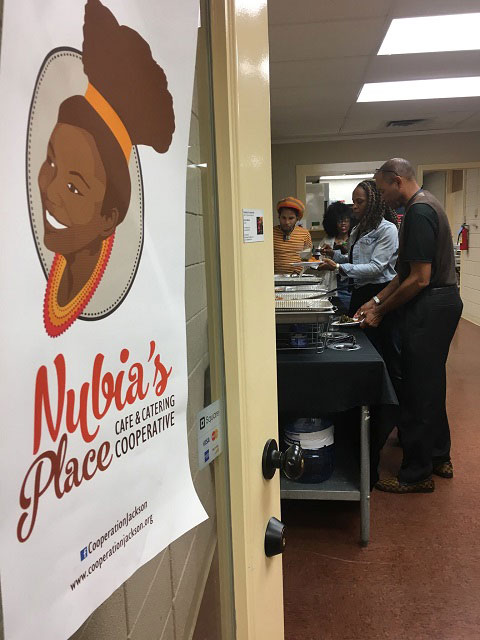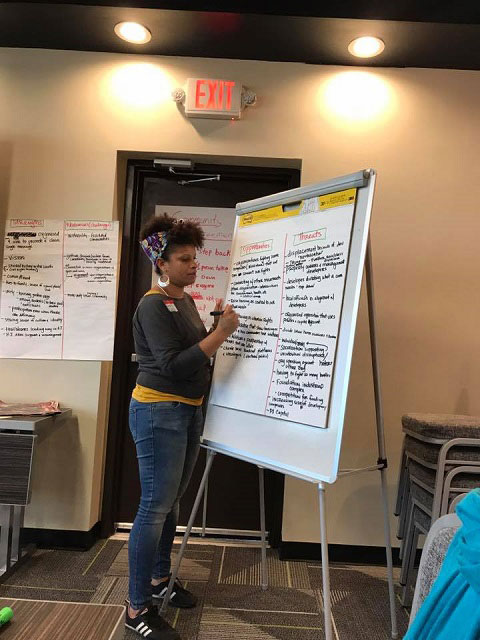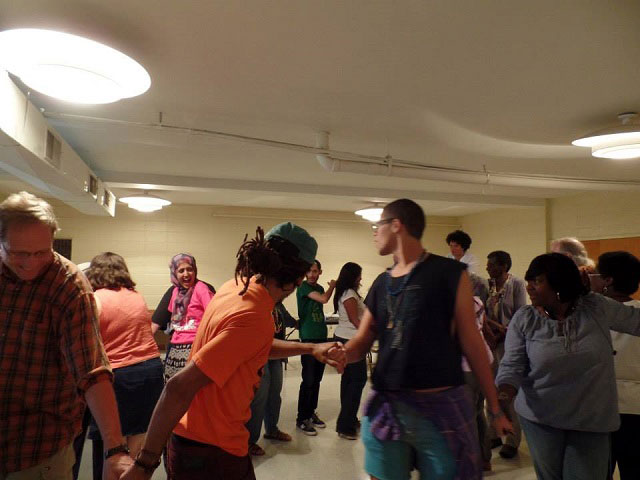The following is an excerpt from the recently published book Jackson Rising: The Struggle for Economic Democracy and Self-Determination in Jackson, Mississippi. Jackson Rising is a chronicle of one of the most dynamic but under-documented experiments in radical social transformation taking place in the United States. The book documents the ongoing organizing and institution-building of the political forces concentrated in Jackson, Mississippi, dedicated to advancing the “Jackson-Kush Plan.“ These forces include the Jackson People’s Assembly, the New Afrikan People’s Organization, the Malcolm X Grassroots Movement, the Jackson Human Rights Institute and Cooperation Jackson.
The fundamental program and strategy of Cooperation Jackson is anchored in the vision and macro-strategy of the Jackson-Kush Plan. The Jackson-Kush Plan, as you will read later in this book, was formulated by the New Afrikan People’s Organization (NAPO) and the Malcolm X Grassroots Movement (MXGM) between 2004 and 2010, to advance the development of the New Afrikan Independence Movement and hasten the socialist transformation of the territories currently claimed by the United States settler-colonial state. And as noted in several articles throughout the book, Cooperation Jackson is a vehicle specifically created to advance a key component of the Jackson-Kush Plan, namely the development of the solidarity economy in Jackson, Mississippi to advance the struggle for economic democracy as a prelude towards the democratic transition to eco-socialism.
 Nubia’s Place Cafe and Catering Cooperative catering an event in the summer of 2017. Nubia’s is one of three new cooperatives formed by Cooperation Jackson. (Photo: Cooperation Jackson)Although Cooperation Jackson is rooted in an ideological framework, vision and macro-strategy, it is not a static organization. Like any dynamic organization we do our best to center our practice on addressing the concrete conditions of our space, time and conditions and to align our theory with our practice. As such, our program and strategy are constantly adapting and evolving to address new challenges and seize new opportunities. And it will continue to do so.
Nubia’s Place Cafe and Catering Cooperative catering an event in the summer of 2017. Nubia’s is one of three new cooperatives formed by Cooperation Jackson. (Photo: Cooperation Jackson)Although Cooperation Jackson is rooted in an ideological framework, vision and macro-strategy, it is not a static organization. Like any dynamic organization we do our best to center our practice on addressing the concrete conditions of our space, time and conditions and to align our theory with our practice. As such, our program and strategy are constantly adapting and evolving to address new challenges and seize new opportunities. And it will continue to do so.
End Pursuits
The fundamental program and strategy of Cooperation Jackson is intended to accomplish four fundamental ends: 1.) to place the ownership and control over the primary means of production directly in the hands of the Black working class of Jackson, 2.) to build and advance the development of the ecologically regenerative forces of production in Jackson, Mississippi, 3.) to democratically transform the political economy of the city of Jackson, the state of Mississippi, and the southeastern region, and 4.) to advance the aims and objectives of the Jackson-Kush Plan, which are to attain self-determination for people of African descent and the radical, democratic transformation of the state of Mississippi (which we see as a prelude to the radical decolonization and transformation of the United States itself).
Controlling the Means of Production
We define the means of production as the physical, non-human inputs that enable humans to transform the natural world to provide sustenance for themselves. The inputs in question are arable land, access to water, natural resources (wood, metals, minerals, etc.), and the tools and facilities that enable the cultivation of food and the transformation of raw materials into consumable goods and services, and the production or capturing of energy to power the tools and facilities. We also add control over processes of material exchange and energy transfer to our definition to give it greater clarity and force of meaning in line with our commitment to sustainability and environmental justice. The processes we feel are therefore necessary to control are the processes of distribution, consumption, and recycling and/or reuse. Without assuming some responsibility for these processes, we merely perpetuate the dynamics of externalization, particularly the production of pollution and the stimulation of waste from overproduction that are inherent in the capitalist mode of production.
A population or people that does not have access to and control over these means and processes cannot be said to possess or exercise self-determination. The Black working class majority in Jackson does not have control or unquestionable ownership over any of these means or processes. Our mission is to aid the Black working class in Jackson, and the working class overall, attain them.
Building the Productive Forces
On the question of building the productive forces in Jackson, it should be noted that while Jackson is the largest city in the state of Mississippi, and arguably the most industrialized city in the state, it is not and never has been a major center or hub of industrial production. Like most of the Deep South, Mississippi’s development as a settler-colonial state has fundamentally been contingent upon the extraction of natural resources, such as timber for colonial and antebellum era ship building, and cash crop agriculture, such as cotton, tobacco, sugarcane, and rice, which were primarily sold as international commodities. Mississippi, like most of the South (North Carolina, Florida, and Texas being unique exceptions each in their own right), has not been able to break out of its historic position within the US and world capitalist system of being a site of resource extraction and the super-exploitation of labor. One of our primary tasks is to break this structural relationship by playing a leading role in industrializing Jackson, first and foremost, then the Kush district, and eventually the entirety of Mississippi.
 Cooperation Jackson executive committee member Sacajawea Hall gives a presentation on the development of the Fannie Lou Hamer Community Land Trust, summer 2017. (Photo: Cooperation Jackson)In many respects, we are positioning ourselves to act as a “developer,“ which is normally a role that is exclusively played by the bourgeoisie, i.e. the capitalist class, or the state. We are aiming to upend this paradigm on many levels and in several strategic ways. One, we are seeking to negate the role of capital being the primary determinate of the social development of Jackson (see point below about exploiting the dynamic of uneven development within the capitalist system below), by situating this role in the hands of the working class through the agency of its own autonomous organizations and its control over the municipal state apparatus. But, we are not seeking to replicate the dynamics of “development” in the standard capitalist sense. The central dynamic in our quest to upend the old aims, norms, processes and relationships of capitalist development, which have little to no regard for the preservation of the environment and ecology, and replace them with new norms that are fixed first and foremost on repairing the damage done to our environment and ecosystems, and creating new systems that will ultimately regenerate the bounty of life on our planet, in all its diversity. This will be possible by strategically incorporating, utilizing, and innovating upon the technologies of the third and (emerging) forth waves of the industrial revolution, which enable the elimination of scarcity, but within ecological limits (see more on this point below). What we aim to do is make Jackson a hub of community production, which is anchored by 3D print manufacturing for community consumption, i.e. direct use-value consumption, and commodity production, to exchange value in consumer markets. How we plan to advance this initiative will be discussed in more detail below.
Cooperation Jackson executive committee member Sacajawea Hall gives a presentation on the development of the Fannie Lou Hamer Community Land Trust, summer 2017. (Photo: Cooperation Jackson)In many respects, we are positioning ourselves to act as a “developer,“ which is normally a role that is exclusively played by the bourgeoisie, i.e. the capitalist class, or the state. We are aiming to upend this paradigm on many levels and in several strategic ways. One, we are seeking to negate the role of capital being the primary determinate of the social development of Jackson (see point below about exploiting the dynamic of uneven development within the capitalist system below), by situating this role in the hands of the working class through the agency of its own autonomous organizations and its control over the municipal state apparatus. But, we are not seeking to replicate the dynamics of “development” in the standard capitalist sense. The central dynamic in our quest to upend the old aims, norms, processes and relationships of capitalist development, which have little to no regard for the preservation of the environment and ecology, and replace them with new norms that are fixed first and foremost on repairing the damage done to our environment and ecosystems, and creating new systems that will ultimately regenerate the bounty of life on our planet, in all its diversity. This will be possible by strategically incorporating, utilizing, and innovating upon the technologies of the third and (emerging) forth waves of the industrial revolution, which enable the elimination of scarcity, but within ecological limits (see more on this point below). What we aim to do is make Jackson a hub of community production, which is anchored by 3D print manufacturing for community consumption, i.e. direct use-value consumption, and commodity production, to exchange value in consumer markets. How we plan to advance this initiative will be discussed in more detail below.
 Members of Cooperation Jackson participate in a democracy practice exercise, fall 2014. (Photo: Cooperation Jackson)
Members of Cooperation Jackson participate in a democracy practice exercise, fall 2014. (Photo: Cooperation Jackson)
Democratically Transforming the Economy
In order to democratically transform the capitalist world-economy, we have to transform the agent central to this process, the working class, into a democratic subject. This transformation starts with the self-organization of the working class itself. Although not foreign to the working class historically by any means, particularly to the Black working class in the United States (which was often left solely to its own ends for self-defense and survival), worker self-organization is not a common feature of the class at present. This is a dynamic that we must change in Jackson (and beyond).
Now, to be clear on terms, self-organization means first and foremost workers directly organizing themselves through various participatory means (unions, assemblies, etc.) primarily at their places of work or points of production, but also where they live, play, pray, and study. The point of this self-organization is for workers to make collective, democratic decisions about how, when, and to what ends their labor serves, and about how to take action collectively to determine the course of their own lives and the animus of their own actions.
We will not and cannot accomplish any of the core ends described above without stimulating the self-organization of the Black working class in Jackson on a mass scale. While Cooperation Jackson, the Malcolm X Grassroots Movement and the broad forces aligned with the Jackson-Kush Plan have made some significant social and political advances and demonstrated our capacity to reach the masses, particularly in the electoral arena, we still haven’t stimulated the self-organization of the Black working class on a mass scale. More work, profoundly more, must be done to accomplish the main tasks in this regard, which are to elevate and strengthen the class-consciousness of the community, foster and cultivate new relationships of social solidarity amongst the working class, and co-construct and advance new social norms and values rooted in radical ecological and humanitarian principles. In effect, what we are aiming to do is develop a new transformative culture.
In order to reinforce the development of this new culture within the present confines of Mississippi and the overall capitalist world-system, we have to harness the power of the Black working class and utilize it politically to eliminate the structural barriers blocking the “legal” development of the solidarity economy within the state. One of the main things we have to eliminate are the Mississippi legal statutes that presently restrict cooperatives to farming businesses, utilities, and credit unions. We have to create a new legal framework and paradigm that will enable any form of productive endeavor to become a cooperative or solidarity enterprise.
In the Jackson context it is only through the mass self-organization of the working class, the construction of a new democratic culture, and the development of a movement from below to transform the social structures that shape and define our relations, particularly the state (i.e. government), that we can conceive of serving as a counter-hegemonic force with the capacity to democratically transform the economy. Again, we have taken some baby steps in this direction with the Mayoral election of Chokwe Lumumba in 2013 and the founding of Cooperation Jackson in 2014. But, we have a long way to get where we desire and need to be.
Advancing the Jackson-Kush Plan
“Politics without economics is symbol without substance.” This old Black Nationalist adage summarizes and defines Cooperation Jackson’s relationship to the Jackson-Kush Plan and the political aims and objectives of the New Afrikan People’s Organization and the Malcolm X Grassroots Movement in putting it forward. Without a sound economic program and foundation the Jackson-Kush Plan is nothing more than a decent exposition of revolutionary nationalist politics. Cooperation Jackson is the vehicle we have collectively created to insure that we do more than just espouse good rhetoric, but engage in a concrete struggle to create a democratic economy that will enable Black and other colonized, oppressed and exploited people to exercise self-determination in Mississippi (and beyond).
We have to be clear, crystal clear, that self-determination is unattainable without an economic base. And not just your standard economic base, meaning a capitalist oriented one, but a democratic one. Self-determination is not possible within the capitalist social framework, because the endless pursuit of profits that drives this system only empowers private ownership and the individual appropriation of wealth by design. The end result of this system is massive inequality and inequity. We know this from the brutality of our present experience and the nightmares of history demonstrated to us time and time again over the course of the last 500 years.
We strive to build a democratic economy because it is the surest route to equity, equality, and ecological balance. Reproducing capitalism, either in its market oriented or state-dictated forms, will only replicate the inequities and inequalities that have plagued humanity since the dawn of the agricultural revolution. We believe that the participatory, bottom-up democratic route to economic democracy and eco-socialist transformation will be best secured through the anchor of worker self-organization, the guiding structures of cooperatives and systems of mutual aid and communal solidarity, and the democratic ownership, control, and deployment of the ecologically friendly and labor liberating technologies of the forth industrial revolution.
As students of history, we have done our best to try and assimilate the hard lessons from the 19th and 20th century national liberation and socialist movements. We are clear that self-determination expressed as national sovereignty is a trap if the nation-state does not dislodge itself from the dictates of the capitalist system. Remaining within the capitalist world-system means that you have to submit to the domination and rule of capital, which will only empower the national bourgeoisie against the rest of the population contained with the nation-state edifice. However, we are just as clear that trying to impose economic democracy or socialism from above is not only very problematic as an anti-democratic endeavor, but it doesn’t dislodge capitalist social relations, it only shifts the issues of labor control and capital accumulation away from the bourgeoisie and places it in the hands of the state or party bureaucrats. We are clear that economic democracy and the transition to eco-socialism have to come from below, not from above. That workers and communities have to drive the social transformation process through their self-organization and self-management, not be subject to it. This does not mean that individuals, organizations, and political forces shouldn’t try to intervene or influence the development of the working class and our communities. We believe that we should openly and aggressively present our best ideas, programs, strategies, tactics, plans, etc. to the working class and to our communities in open forums, discussions, town halls, assemblies, etc., and debate them out in a principled democratic fashion to allow the working class and our communities to decide for themselves whether they make sense and are worth implementing and pursuing.
On December 19, Democracy at Work, in support of Cooperation Jackson, will celebrate the release of Jackson Rising in New York with a presentation by Kali Akuno, as well as a roundtable discussion with world-renowned economist Richard Wolff, political economist Jessica Gordon Nembhard and 2017 New York City council candidate Jabari Brisport. Click here for more details.
Join us in defending the truth before it’s too late
The future of independent journalism is uncertain, and the consequences of losing it are too grave to ignore. To ensure Truthout remains safe, strong, and free, we need to raise $50,000 in the next 9 days. Every dollar raised goes directly toward the costs of producing news you can trust.
Please give what you can — because by supporting us with a tax-deductible donation, you’re not just preserving a source of news, you’re helping to safeguard what’s left of our democracy.
